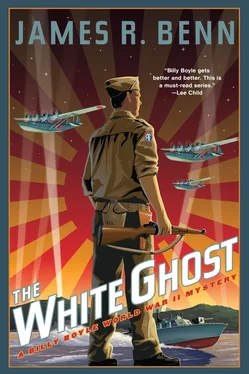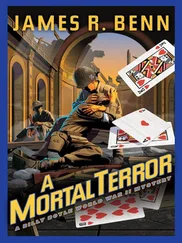James Benn - The White Ghost
Здесь есть возможность читать онлайн «James Benn - The White Ghost» весь текст электронной книги совершенно бесплатно (целиком полную версию без сокращений). В некоторых случаях можно слушать аудио, скачать через торрент в формате fb2 и присутствует краткое содержание. Год выпуска: 2015, Издательство: Soho Press, Жанр: Шпионский детектив, на английском языке. Описание произведения, (предисловие) а так же отзывы посетителей доступны на портале библиотеки ЛибКат.
- Название:The White Ghost
- Автор:
- Издательство:Soho Press
- Жанр:
- Год:2015
- ISBN:нет данных
- Рейтинг книги:3 / 5. Голосов: 1
-
Избранное:Добавить в избранное
- Отзывы:
-
Ваша оценка:
- 60
- 1
- 2
- 3
- 4
- 5
The White Ghost: краткое содержание, описание и аннотация
Предлагаем к чтению аннотацию, описание, краткое содержание или предисловие (зависит от того, что написал сам автор книги «The White Ghost»). Если вы не нашли необходимую информацию о книге — напишите в комментариях, мы постараемся отыскать её.
The White Ghost — читать онлайн бесплатно полную книгу (весь текст) целиком
Ниже представлен текст книги, разбитый по страницам. Система сохранения места последней прочитанной страницы, позволяет с удобством читать онлайн бесплатно книгу «The White Ghost», без необходимости каждый раз заново искать на чём Вы остановились. Поставьте закладку, и сможете в любой момент перейти на страницу, на которой закончили чтение.
Интервал:
Закладка:
“There is logic to that. We could simply wait until he is withdrawn from Choiseul,” Kaz said.
“Well, we’re not waiting around for that,” I said. “And Fraser is smart. He might decide to pull another disappearing act if he senses anything is up. The last thing he’d expect would be for us to apprehend him behind enemy lines.”
“There is some logic to that as well,” Kaz said with a sly grin.
“Besides, I don’t think either of us wants to hang around the Solomons any longer than we have to,” I said, hoisting myself out of the launch and heading for our jeep, still in one piece after yesterday’s raid. Heavy grey clouds blew in from the east, winds moving the hot, humid air without providing one bit of relief. Our khakis were soaked with sweat, and it was still early morning. When the rains came, sheets of warm water washed us clean for a moment, and then stopped abruptly, leaving us wet, steamy, and smelling slightly of mold.
At the POW enclosure three trucks were being loaded up with prisoners. We watched the small convoy depart, jeeps with GIs cradling Thompson submachine guns following each of the transports. The prisoners looked worried, perhaps wondering if the propaganda had been right and they were being taken off to be executed.
“Don’t worry,” Sakato said, approaching us from the Quonset hut. “None of those are of interest to you. I found four men who were on Pavau. You can see them whenever you want.”
“Great,” I said. “Where are those prisoners headed? They looked pretty glum.”
“New Zealand,” Sakato said. “Some guys have all the luck. They’re frightened of going to a larger camp. More chance of running into hard-core types.”
“Hard-core types wouldn’t surrender in the first place, would they?” Kaz asked.
“Not willingly, no. Some are found wounded or unconscious and wake up really unhappy to be alive. If they don’t find a way to commit suicide, they make life miserable for everyone else. But your four men aren’t in that category. How do you want to handle this?”
“Let’s talk to them one at a time, okay?”
“No problem,” Sakato said as we followed him inside. “I’ll have them brought into the interrogation tent. You guys leave your pistols in my office. No weapons, remember?”
“I thought you said these four wouldn’t be a problem,” Kaz said, unbuckling his web belt.
“No reason to tempt fate,” Sakato said. “I speak the language like a native, but there is still much I don’t understand about Japanese people. I wouldn’t put it past the mildest, most peaceful prisoner to kill himself and take some of us with him. It’s been beaten into these men from birth.”
“Cheery guy,” I whispered to Kaz as we stashed my.45 automatic and his Webley revolver in Sakato’s office.
“Another man between two worlds,” Kaz said. “I do not envy him.”
“I don’t envy anyone on this island except Josh Coburn and his coffee,” I said, as we made for the interrogation tent. The flaps were rolled up to let in what breeze there was, except for the side that faced the POW pen. No reason to advertise. Guards flanked the entrance, rifles with bayonets fixed at parade rest. Sergeant Harrison guided in the first prisoner, ushering him to the chair opposite Sakato. A small table separated us, with Sakato in the middle and Kaz and me taking a back seat on either side.
“Taku Ishii, Private First Class, 20th Division,” Sakato said, looking up from the file in front of him. The soldier nodded, bowing deeply to Sakato, hands straight at his side. Sakato nodded his head slightly in return, and gestured for the man to sit. He did so nervously, bobbing his head and chattering in what seemed like endless thanks. He was nearly bald, what hair he had cropped short. He was thin and bony, with a long face and sad eyes. His light-brown uniform was worn but clean, and I knew his condition was far, far better than what our boys were enduring in Japanese camps.
“Ask him where and when he landed on Pavau,” I said. Sakato rattled off the questions in Japanese and listened to the answer, jotting notes as he did so.
“It was in May of 1942,” Sakato said. “He doesn’t remember the date. He was on a destroyer that docked on the southern tip of the island. He says there was no fighting, no resistance.”
“Did he hear of fighting anywhere else on Pavau?” I asked.
“No,” Sakato said following their exchange. “He says he was there for less than a week, and pulled out when the navy garrisoned the harbor. He does remember bodies washing up on shore, but says they were civilians drowned in a ferry accident.”
“Did he go to the northern end of Pavau?” Kaz asked. No, came the reply. He never left the harbor area.
Next up was Matsudo Kufuku, Leading Seaman with the 3rd Kure Special Naval Landing Force. He performed the same bow before taking his seat. He looked tough, not quite as nervous as the first guy. His faded green uniform hung loosely on his frame.
“He’s a marine, right?” I asked.
“Naval infantry, yes,” Sakato said. “Our marines don’t think much of them, but that’s to be expected.”
“Can we give him a cigarette?” I asked, noting how Matsudo studied each of us. Wary eyes, but unworried. I had the sense he was a survivor.
“Sure,” Sakato said, shaking two Lucky Strikes from his pack, rolling one across the table to Matsudo, taking the other for himself. He lit both from his Zippo, and Matsudo leaned back, drawing the smoke in deep and smiling as he exhaled. Sakato asked the first question.
“Yes, he remembers. May, 1942. His platoon landed on the north side, in an armed barge, covered by destroyers. He says there was a small dock, but no enemy ships opposed them.”
“The north side? Are you sure?” Sakato repeated the question.
“Hai,” with the self-assurance that told me it meant yes.
“Ask him if they encountered resistance,” I said.
“Yes,” Sakato said, after listening to what sounded like an angry response. “First an ensign was shot and killed. He was popular with the men, since he didn’t treat them harshly.”
“Then?”
“They fired into the bush where they thought the shot had come from,” Sakato said. “They were all very angry.”
“It was a single shot?” I asked. That got another hai , followed by a more subdued response.
“He says,” Sakato began, releasing a deep sigh, “that the road from the dock led to a plantation. A big house, surrounded by smaller buildings. They fanned out, worried about the sniper. Natives came out and began waving their arms and shouting, but no one understood. He thinks they were being friendly, but others thought they were threatening.”
“Did he see a white man?” I asked.
“Yes. An old white man, he says. He came out of the house and stood with his hands held high. He spoke to the lieutenant in charge, but no one understood him. Then another shot was fired.”
“By the sniper?”
“Yes, Matsudo is certain of that. It didn’t hit anyone, but the natives started to run, the old man was shouting, and suddenly there was a lot of firing.”
“They killed them all,” I said.
Hai .
The next two POWs were of no help. One soldier who’d also landed on the southern shore and a mechanic who worked at a seaplane base on Pavau weeks after the invasion. But we only needed to hear that story once.
“What are you going to do with him?” Kaz asked Sakato when we were back in his office, buckling our web belts.
“Not much I can do,” he said. “He denies taking part in the slaughter. His story is that most of the other men had never been in combat, and that they were nervous and upset after their ensign was killed.”
Читать дальшеИнтервал:
Закладка:
Похожие книги на «The White Ghost»
Представляем Вашему вниманию похожие книги на «The White Ghost» списком для выбора. Мы отобрали схожую по названию и смыслу литературу в надежде предоставить читателям больше вариантов отыскать новые, интересные, ещё непрочитанные произведения.
Обсуждение, отзывы о книге «The White Ghost» и просто собственные мнения читателей. Оставьте ваши комментарии, напишите, что Вы думаете о произведении, его смысле или главных героях. Укажите что конкретно понравилось, а что нет, и почему Вы так считаете.












